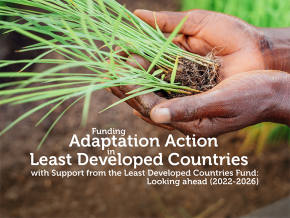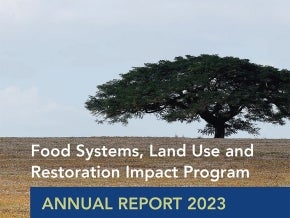
The Global Coordination Platform of the Capacity-building Initiative for Transparency (CBIT) will support openness and delivery of national climate plans in developing countries.
A small but important step toward building a more climate secure future was taken today with the launch of the Global Coordination Platform of the Capacity-building Initiative for Transparency (CBIT), an initiative to help build mutual trust and confidence among countries as they develop and deliver their national climate plans.
The platform was launched this week in Copenhagen at the CBIT Coordination Meeting funded by the Global Environment Facility (GEF) and co-organized by UNDP, UN Environment and UNEP DTU Partnership, with the support of the Global Support Programme for National Communications and Biennial Update Reports (GSP). The new platform will facilitate knowledge exchange from CBIT projects among countries, maximize learning opportunities, and enhance coordination among transparency practitioners.
“Increasing transparency and enhancing countries’ capacity for monitoring and evaluation are lynchpins for the Paris Agreement,” said Naoko Ishii, GEF CEO and Chairperson. “The CBIT will allow us to see early action on the ground, and help countries scale up their efforts to deliver their national climate plans, or NDCs.”
Speaking from the launch in Copenhagen, Dustin Schinn, GEF Climate Change Specialist, said, “This new platform will engage countries, agencies, and other relevant institutions to enhance the partnership of national, multilateral, and bilaterally-supported capacity-building initiatives. Together, we can make CBIT a strong foundation for an inclusive and effective Paris Agreement.”
The CBIT, officially declared “open for business” by Naoko Ishii, at UNFCCC COP 22 in Marrakech, is already helping developing countries meet the requirements of the enhanced transparency framework for action and support agreed upon in the Paris Agreement. The four national projects approved to date under the CBIT and incoming project proposals are tailor-made to address the individual transparency needs of developing countries.

Costa Rica’s project, for example, will enhance capacity for their nationwide climate actions inventory and further develop a monitoring, reporting, and verification (MRV) methodology framework.
Kenya aims to strengthen national institutions for transparency-related activities, and seeks to enhance methodological frameworks for estimating land based emissions, which account for over 70% of Kenya’s greenhouse gas emissions.
With its project, South Africa seeks to enhance capacity building and implementation of its National Climate System, through national coordination with academic institutions to address long-term capacity needs and establish a cadre of national experts in MRV.
While a project in Uruguay will improve its national GHG inventory, including through learning from regional peer exchange programs on transparency activities.
Implementing agencies include UN Environment, UNDP and Conservation International (CI).
The Global Coordination Platform will bring all of these and future projects together to enable coordination, maximize learning opportunities, and facilitate knowledge sharing. Specifically, the platform will enhance coordination for transparency practitioners and donors through a web-based coordination platform, identify needs and gaps for enhancing national transparency systems, enable CBIT practitioners to gain access to emerging practices, methodologies and guidance, and share lessons learned through regional and global meetings.
The coordination meeting in Copenhagen provided a space for discussing CBIT expected results and for strengthening coordination among donors and implementing organizations. It was followed by a technical workshop on the CBIT Global Coordination Platform, where the technical support available was presented to interested developing countries, and needs and gaps for enhanced transparency systems were identified. GEF agencies including UNDP, UN Environment, CI and FAO also participated in the workshop.
The meeting also provided an opportunity to discuss developing country priorities for CBIT programming, in order to create a strong pipeline of high-quality projects for submission to the GEF Secretariat for review and approval. Over 30 interested developing countries are currently in the process of developing their CBIT initiatives and used the workshop to learn from the experience of the first countries who had CBIT projects approved. Developed countries, including Canada, Germany, Japan and the United Kingdom, shared insights about their experience with national climate transparency, and shared lessons on long-term institutional capacity development.

Transparency is the foundation of the Paris Agreement’s “ambition mechanism,” a unique way that allows countries to ratchet up their ambition. Regular global stock-takes evaluate whether the world is on track to limit warming to 2 or 1.5 degrees; countries can then submit more and more ambitious national climate plans (NDCs).
Many developing countries lack the capacity to effectively monitor and report their progress vis-à-vis national greenhouse gas emission reduction, and track progress made in their NDC implementation. They may also face challenges in getting credible information on adaptation and resilience to cope with the effects of climate change.
To help developing countries in their efforts to build institutional and technical capacity for enhanced transparency, Parties requested the GEF at COP 21 to support the establishment and operation of a CBIT.


